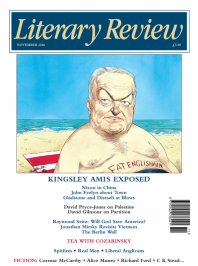Kathy Watson
Haunting the Past
The Boy Who Fell out of the Sky
By Ken Dornstein
Hodder & Stoughton 335pp £14.99
When David Dornstein boarded Pan Am Flight 103 from London to New York on 21 December 1988, he was supposed to be carrying the manuscript of his first novel. According to a newspaper report published shortly after a bomb sent the plane and all its passengers crashing into the Scottish town of Lockerbie, the novel was brilliant and eagerly awaited by a number of American publishers. Then it was lost, scattered, destroyed as thoroughly as 25-year-old David’s life.
The crash happened, David died, but was there ever a manuscript? It is for David’s younger brother, Ken, to find out. His attempts to piece together the life and writings of his older brother provide the narrative framework for this clear-eyed and painfully raw memoir.
Ken worked for a while as a private investigator, and in researching his brother’s death he is diligent and painstaking. He visits Lockerbie and interviews the policemen who were first on the scene. He has dinner with one and plays golf with others, on a course where many of the bodies landed. He visits Israel where David was living just before his death. He finds out the body’s sensations when cabin pressure drops suddenly and he researches the history of Pan Am and the development of the 747.
He talks to David’s old friends, meets one of his old girlfriends and marries another. Jewish but not observant, he is fascinated by the opposing demands of the Old Testament. According to Leviticus, he writes, ‘if an older brother died without leaving a son, the next-oldest brother was supposed to take up with the widow’. But then, Leviticus is equally strict in the opposing view: ‘Do not uncover the nakedness of your brother’s wife, it is the nakedness of your brother.’ Even after he’s been married for years, Ken is still troubled by his choice. It takes time, therapy and what sounds like dogged determination on his wife Kathryn’s part before he can relax into family life.
Above all, his research takes him into David’s writing. He reads David’s letters and his notebooks – dozens of them – containing short stories, diary entries, accounts of his sexual adventures, the blurb for his first book and his mini-obituary. And this startlingly prescient sentence: ‘Humorously, tragically, I really am starting to believe that the only way any of these notebooks will mean anything is if I die an early death.’
That is exactly what happened. The notebooks became part of the material for someone else’s book. It is Ken, not David, who became the writer, Ken not David who marries Kathryn and fathers a son. David is so vividly realised, so much a presence in Ken’s life, that it is sometimes hard to remember that he’s dead. This book is not about being haunted by the past, it’s about haunting it. Ken’s obsession with uncovering David’s life prevents him from living his own. He is thirty before he can accept a proper job and he is rather touchingly amazed by the pleasure of receiving a salary. ‘Apologies to David if I’d given up on the hard road in life – the Artist’s tortured and lonely way – but I couldn’t continue in his footsteps.’
Dornstein leaves a lot unsaid: there is no evaluation of the literary merit of the notebooks, and he describes, without comment, behaviour that suggests his brother’s mind was frequently disturbed – how he would eat and sleep on the floor surrounded by a wall of books, living on packets of sugar for fuel. He also, most remarkably of all, avoids self-pity and is frequently humorous.
Memoir, in Dornstein’s hands, becomes as much about letting go as it is about remembering. ‘Now, I think that forgetting is a gift, the thing that makes life possible, and being the curator of the Dave Archives is a job I’ve become okay with quitting.’ You can sense his relief when he finishes the book.
Perhaps David did write a masterpiece, a brilliant coming-of-age novel that would have won him early fame. We will never know. Instead we have this, his brother’s moving tribute to him – an eloquent memoir of his short life and fragmented writing, and a testament to the power of love.

Sign Up to our newsletter
Receive free articles, highlights from the archive, news, details of prizes, and much more.@Lit_Review
Follow Literary Review on Twitter
Twitter Feed
The son of a notorious con man, John le Carré turned deception into an art form. Does his archive unmask the author or merely prove how well he learned to disappear?
John Phipps explores.
John Phipps - Approach & Seduction
John Phipps: Approach & Seduction - John le Carré: Tradecraft; Tradecraft: Writers on John le Carré by Federico Varese (ed)
literaryreview.co.uk
Few writers have been so eagerly mythologised as Katherine Mansfield. The short, brilliant life, the doomed love affairs, the sickly genius have together blurred the woman behind the work.
Sophie Oliver looks to Mansfield's stories for answers.
Sophie Oliver - Restless Soul
Sophie Oliver: Restless Soul - Katherine Mansfield: A Hidden Life by Gerri Kimber
literaryreview.co.uk
Literary Review is seeking an editorial intern.